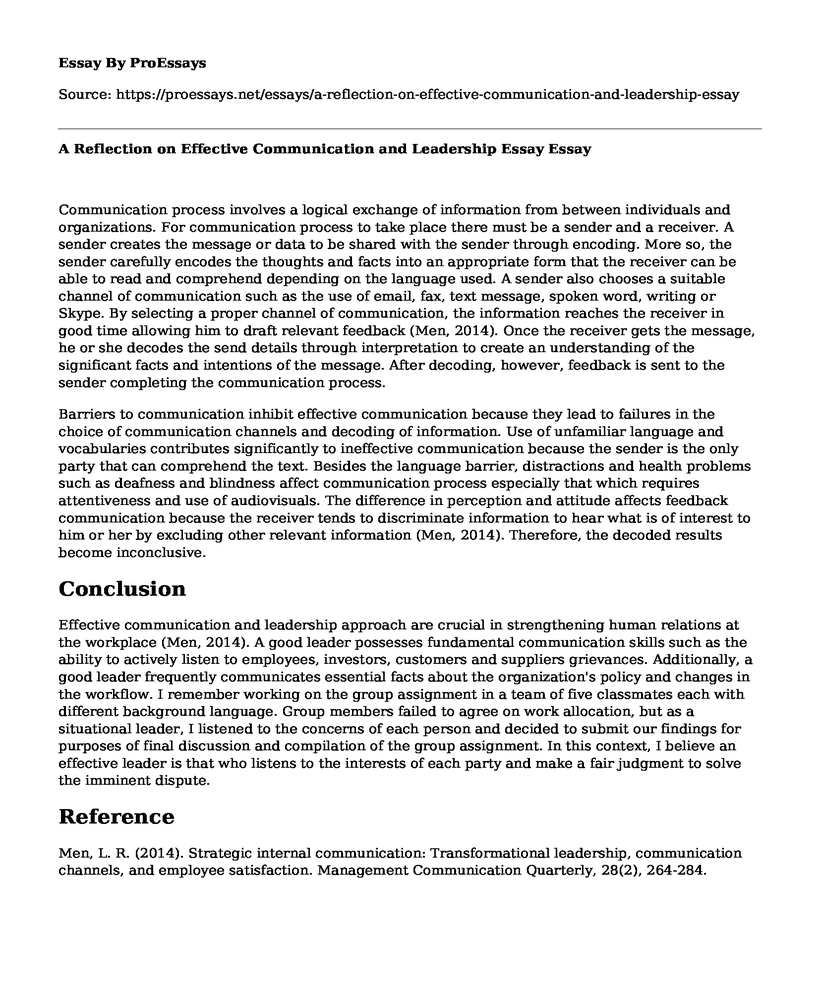Communication process involves a logical exchange of information from between individuals and organizations. For communication process to take place there must be a sender and a receiver. A sender creates the message or data to be shared with the sender through encoding. More so, the sender carefully encodes the thoughts and facts into an appropriate form that the receiver can be able to read and comprehend depending on the language used. A sender also chooses a suitable channel of communication such as the use of email, fax, text message, spoken word, writing or Skype. By selecting a proper channel of communication, the information reaches the receiver in good time allowing him to draft relevant feedback (Men, 2014). Once the receiver gets the message, he or she decodes the send details through interpretation to create an understanding of the significant facts and intentions of the message. After decoding, however, feedback is sent to the sender completing the communication process.
Barriers to communication inhibit effective communication because they lead to failures in the choice of communication channels and decoding of information. Use of unfamiliar language and vocabularies contributes significantly to ineffective communication because the sender is the only party that can comprehend the text. Besides the language barrier, distractions and health problems such as deafness and blindness affect communication process especially that which requires attentiveness and use of audiovisuals. The difference in perception and attitude affects feedback communication because the receiver tends to discriminate information to hear what is of interest to him or her by excluding other relevant information (Men, 2014). Therefore, the decoded results become inconclusive.
Conclusion
Effective communication and leadership approach are crucial in strengthening human relations at the workplace (Men, 2014). A good leader possesses fundamental communication skills such as the ability to actively listen to employees, investors, customers and suppliers grievances. Additionally, a good leader frequently communicates essential facts about the organization's policy and changes in the workflow. I remember working on the group assignment in a team of five classmates each with different background language. Group members failed to agree on work allocation, but as a situational leader, I listened to the concerns of each person and decided to submit our findings for purposes of final discussion and compilation of the group assignment. In this context, I believe an effective leader is that who listens to the interests of each party and make a fair judgment to solve the imminent dispute.
Reference
Men, L. R. (2014). Strategic internal communication: Transformational leadership, communication channels, and employee satisfaction. Management Communication Quarterly, 28(2), 264-284.
Cite this page
A Reflection on Effective Communication and Leadership Essay. (2022, Jun 16). Retrieved from https://proessays.net/essays/a-reflection-on-effective-communication-and-leadership-essay
If you are the original author of this essay and no longer wish to have it published on the ProEssays website, please click below to request its removal:
- Paper Example on Benefits of Personal Injury Attorneys to the Society
- Essay Sample on Communication Technology and the Impact on Society
- Essay Sample on Interpersonal Problems Among College Students: Increasing Rates & Solutions
- Exploring Anthropology Specializations: Political Economy, Power & Politics, Law - Essay Sample
- Essay Sample on Maximizing Performance with Simplification & Innovation Strategies
- Ensuring Efficiency and Profitability: Change Mgmt Strategies for Businesses - Essay Sample
- Essay Sample on 7 Elements of Negotiation: Improve Your Skills Now!







